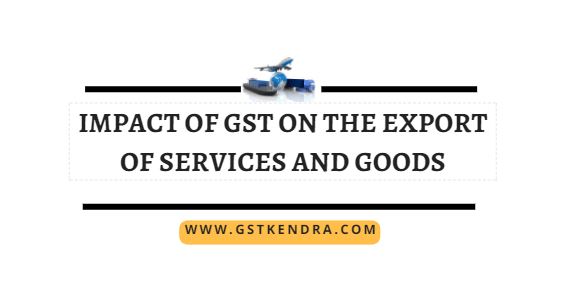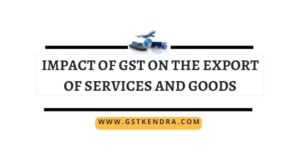Previously, the export of services and goods was subject to a bevy of indirect taxes. Excise tax, customs duty, VAT, service tax, etc. was standard taxes charged from an exporter. Under the GST regime, all these taxes are subsumed into one. However, customs duty is an exemption and still levied on importers as usual.
Currently, there is no duty charged on exporters of services and goods. Above that, an exporter can claim any inputs that are received for purchasing of their raw materials. The government of India is aiming to increase the export of services and goods. To boost their ‘Make in India’ program, the government has offered various perks including zero duty on the exports. However, there is still some ambiguity in this arrangement and traders are looking for more clarification on the subject matter.
Since the export of goods and services is considered a zero-rated supply, there is no GST levied on the same. Under the previous laws, a duty drawback was given for the taxes paid on inputs, provided these inputs were meant for export of goods exempted from taxes. It was truly daunting to claim this drawback. GST will mitigate these issues. Under this new system, duty drawback will be available only for the payment of customs duty on imported goods. Also, it will be allowed on some tobacco and petroleum products that are used as fuel or inputs for captive power generation in India.
Meaning of Export of Services under IGST Act 2017:
Services are treated as an export under below-mentioned circumstances when:
- Service supplier is located in India
- Service recipient is located outside India
- Place of service supplied is located outside India
- Supplier receives payment for such services in convertible foreign exchange
Here, supplier and recipient should be distinct person. For example- ABD consultancy firm in Delhi, India is providing services to XYZ firm in Dubai. Here, the location of supplier is in India, recipient location is Dubai, payment is made in Dirham (convertible foreign exchange) and supplier and recipient are different persons.
The Treatment on Zero-Rated Exports:
The government has issued a guidance note for clearing the doubts related to claims of input tax credits on the zero-rated products. Such exporters can claim refunds for zero-rated goods under two main options, viz.
- They should supply the goods or services, or even both under a Letter or Undertaking or Bond subject to the prescribed safeguards, procedures, and conditions. It can be provided without paying integrated taxes. Then, the exporter can claim a refund of the input tax credit that is unutilized. It requires filing an application for the refund either directly on the common portal or through a notified facilitation centre. Also, an export report must be filed under the Customs Act before filing this application for claiming refunds.
- Refunds can also be claimed by an exporter, Embassy, United Nations, agencies other than those specified in section 55 if they are paying IGST after fulfilling the prescribed conditions, procedures, and safeguards. This refund can be claimed on the tax paid on the goods and services supplied or both. Here, the applicant should follow the rules specified in Section 54 of CGST Act. In this context, the exporter has to submit the shipping bill for the goods exported. The person in charge of the shipment should also provide a complete report with the number and dates of all shipping bills mentioned clearly. The forms are available on the official website of the department.
How Are the Exports of Zero-Rated Services Treated Under GST?
Before claiming a refund of input tax credit, it is essential to determine if as service is covered under the definition given in the law. Any new conditions are not added to the existing definition of Export of Services. The rules for place of supply will vary on a case to case basis for determining their taxability. The location of service recipient is the default place of supply for export of services. The address mentioned in the records of the recipient must exist with the exporter in this case. This rule applies to IT/ITES services including intermediary services, software support, and maintenance.
There are separate implications of GST on software transactions including cloud computing. This is the packaged software that should be treated as ‘Goods’. It should be taxed as per the rates and place of supply applicable to export of goods. The customized software is charged as ‘Services’. Also, the software supplied electronically is charged as ‘Services’ because the definition of goods does not include intangible products. Same goes for the transfer of cloud computing services.
Refund of Input Tax Credit in Export of Goods:
The rules are clearly specified in this regard. They state:
- If the supply of zero-rated goods is made without paying taxes, refund of input tax credit can be claimed under section 54(2) of CGST Act.
- Unutilized input tax credit is not liable to refund in cases other than the zero-rated exports. Also, it states that refund will be available if credit is accumulating due to rate of tax on inputs being higher than the tax on output supplies. Also, this rule exempts nil rated and fully exempted products.
- If the goods exported are subject to export duty, no refund will be allowed on an unutilized tax credit.
- If exporter avails duty drawbacks of SGST/CGST/UTGST or claims refunds on IGST already paid on such exports, no refund will be allowed in these circumstances.
Deemed Exports:
Global tenders are invited for the prestigious projects in India financed by the foreign aid from Asia development bank, World Bank, etc. Indian suppliers face tough competition to win such projects from foreign suppliers. Since services are invited for a project funded with free foreign exchange, there is no customs duty involved in the bids. Supplies to such project where goods and services do not leave the country and payments are received by a supplier under Para 7.02 of Foreign Trade Policy (2015-2020) are termed as Deemed Export.
Following Transactions are treated as Deemed Exports under Foreign Trade Policy (2015-2020):
- Export supplies for UN Agencies
- Export against EPCG
- Export against DFIA/ Advance Authorisation
- Supplying for international competitive bidding project
- Exporting marine freight containers
- Supplying for EOU/ BTP/ EHTP/ STP
- Supplying goods and services for project with zero customs duty
- Supplying services and goods through competitive bidding to a nuclear project
- Supplying services and goods to mega power projects
How Is the Government Looking for Export Promotion under GST?
Export is a priority but WTO recommends free and fair global trade. This rule binds on India as well. Hence, giving incentives to the exporters is against the norms of fair trade. However, these exporters are equally compensated by making their goods and services free from domestic taxes.
Following Are The Benefits Enjoyed By An Exporter Under GST:
- GST exempted from final product
- Refund of ITC on GST paid
Also, the government has planned few schemes for the exporters. These include:
- SEZ allowed importing inputs without paying duty and export finished goods
- Schemes of Advance Authorisation, DEPB, and DFIA
- Duty Drawback Scheme
- Scheme for Export Oriented Undertakings
With this comprehensive knowledge about GST implication on Export of Goods and Services, you can run your business smoothly and contribute to the cause of nation building.


